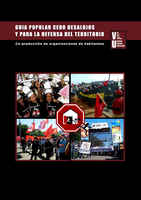The Popular Guide for Zero Evictions and the Defense of Territory
With the presence of more than 120 social leaders from Cameroon, Morocco, Kenya, Zimbabwe, Palestine, Tunisia, India, Germany, Italy, France, Belgium, Spain, Portugal, London, Argentina, Brazil, Dominican Republic, Haiti, Venezuela, Peru, United States, Chile, Colombia and Mexico the Zero Evictions Guide was presented in the context of the thematic WAI workshop organized by IAI on 28th March 2013.
Only you open my eyes to illuminate the flight.
To construct revolts and libertarian spaces. GRC
The participation of Patrik from Kenya; Alexis from Haiti; Soler from Dominican Republic; Vanessa from Spain; Michelangelo from Italy; Leticia from Mexico; Claudio from Chile; Elizabeth from Brazil; Rita from Portugal; Elizabeth from Venezuela and of Ives Cabannes, London, emphasized the capacity, creativity and resistance of the people that with mobilization and organization managed to impede evictions in their respective countries.
It should be noted that in Venezuela the social movement attained an interview with President H. Chavez, they expressed the pain and injustice provoked by the judges who ordered evictions in favor of the interests of the concrete fat cats ??? caciques. The president listened attentively and decided to support the Red Metropolitana de Inquilinos (The Metropolitan Network of Tenants) to establish a law that has a direct impact upon public politics that have avoided up to 95% of evictions throughout the country. Venezuelan law is unique in the world as it recognizes rehousing as on behalf of the state. At the same time, popular movements in Korogocho, Kenya, with the territorial organization in every street and neighborhood, supported by various churches, in a way put a brake on evictions and now are in the phase of bettering their neighborhoods with the resources liberated by the annulations of debt from Kenya with Italy.
Also, in Spain organized neighbors from the Plataforma affected by mortgages with ample mobilizations and a million and a half signatures are appealing to Parliament to approve a law to protect the heritage of families who have lost employment and lack the resources to pay their mortages. In Italy, the Unione Inquilini (the tenants union), in addition to the daily picketing against the evictions, with formidable mobilization in the face of the regional and communal government headquarters made the local authorities emit decrees to avoid evictions. In this wave young people decided to create the organization RAP to support families with judicial and social advice.
Teacher Ives underlined the importance of popular movements and social actors to put their talent and experience into constructing instruments that systematize the resistance and popular struggles that allow massive evictions to be avoided. The most certain example is the “Popular Guide for Zero Evictions and for the Defense of Territory” that emphasizes the diverse experiences in the exercise of making a political territory??? to impede evictions and defend land, the defense of territory is the cosmovision that articulates life, nature, history, biodiversity and democracy. The Guide is a good exercise innovator, that joins the seeds of resistance in a territorial organization and the mobilization, indispensable condition that permits consolidation of good living, in true harmony with nature.
In sum the Guide offers a series of initiatives with which to face evictions provoked by: large international events and megaprojects; large urban Works, to promote the globalization of the city; consumptions; infrastructures and large industrial projects: circulation and distribution of merchandise; stockpiling and looting of resources that are non -renewable and scarce on the planet; catastrophes called “natural” and post disaster evictions; land grabbing and looting of agricultural land; “improvement” of poor neighborhoods and urban regeneration; evictions of tenants of housing: speculative production of housing: housing as a good commercial and financial not as a right: double evacuations and relocating far from place of origin; violent conflicts and displacements; ethnic and cultural cleansing.
Finally Cristina A. recommends that the Popular Guide is appropriates and all are invited to improve it as it is a tool of popular movements to impede evictions and defend local and national territories
>>> Download here the Popular Guide Zero Evictions for the defence of the territory



